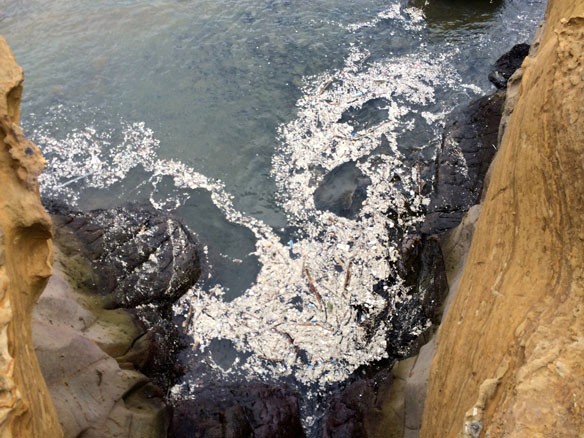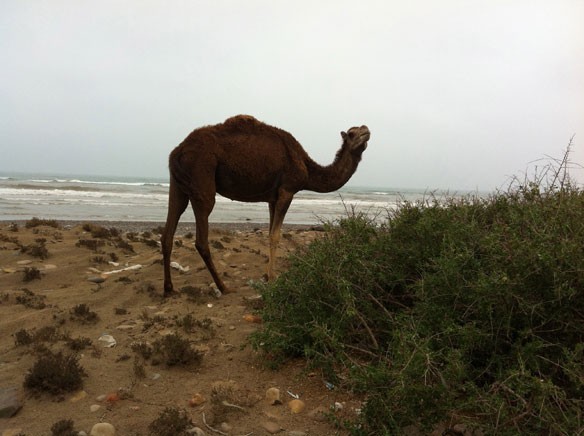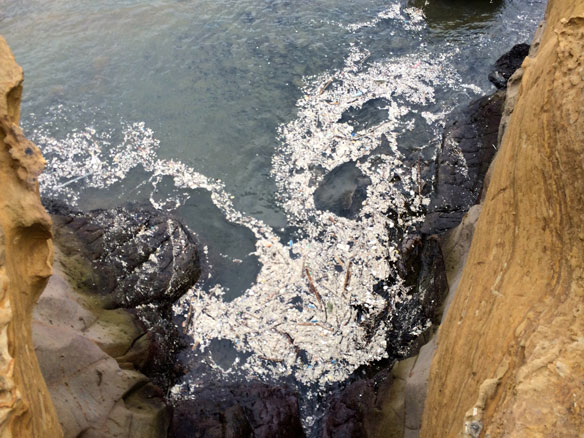
Whether plastics present a unanimously accepted and proven toxic challenge to marine life, and subsequently to humans, is one of the biggest challenges facing scientists right now.
All sea creatures, from the largest to the microscopic organisms are, at one point or another, swallowing the seawater soup instilled with toxic chemicals from plastic decomposition. Much of ocean’s life is in the microscopic size range and zooplankton is the base of the food chain. As environmentalists remind the world’s population: “…We are eating fish that have eaten other fish, which have eaten toxin-saturated plastics…” —Captions and Photo: © SAF — Coastal Care
Excerpts;
Researchers have found that 60 percent of post-hatchling loggerhead turtles stranded on southern Cape beaches in South Africa have been impacted by growing quantities of human-caused debris such as plastic fragments, packaging and fibers…
Read Full Article, EcoWatch (05-031-2016)
Sea Turtles Face Plastic Pollution Peril, University of Exeter (10-09-2015)
A new global review that set out to investigate the hazards of marine plastic pollution has warned that all seven species of marine turtles can ingest or become entangled in the discarded debris that currently litters the oceans, and nesting beaches…
The Plastic Found In a Single Turtle’s Stomach, Independent UK (03-24-2011)
Global Impact of Debris on Marine Life Studied, (02-19-2015)
Nearly 700 species of marine animal have been recorded as having encountered humanmade debris such as plastic and glass according to the most comprehensive impact study in more than a decade…
Death by Plastic: Is Ocean Plastic Garbage Killing Whales?, Independent UK
90 Percent of Seabirds Have Plastic in Their Stomachs, Newsweek (09-01-2015)
Biodegradable Plastics Are Not the Answer to Reducing Marine Litter, UN News Center (11-23-2015)
Widespread adoption of products labelled ‘biodegradable’ will not significantly decrease the volume of plastic entering the ocean or the physical and chemical risks that plastics pose to marine environment, concluded a UN report released today…
The Ocean Is Contaminated by Trillions More Pieces of Plastic Than Thought, IOP Science (12-08-2015)
This new study suggests there are 15 to 51 trillion micro plastic particles (those less than 200 millimeters in size) in the world’s oceans, weighing between 93 and 236,000 metric tons. This is about seven times more than scientists had previously estimated…
More plastic than fish in the sea by 2050, Guardian UK (01-19-2016)
One refuse truck’s-worth of plastic is dumped into the sea every minute, and the situation is getting worse, according to a new report launched at the World Economic Forum today. New plastics will consume 20% of all oil production within 35 years, up from an estimated 5% today…
Plastic Pollution / When The Mermaids Cry: The Great Plastic Tide, Coastal Care
“The unprecedented plastic waste tide plaguing our oceans and shores, can become as limited as our chosen relationship with plastics, which involves a dramatic behavioral change on our part…”

A study reports that as high as 50% of camel deaths are caused by plastic bags’s ingestion…and this was in 1997…— Smeadvisor
“When plastic ingestion occurs, it blocks the digestive tract, gets lodged in animals windpipes cutting airflow causing suffocation, or fills the stomach, resulting in malnutrition, starvation and potentially death. Indeed, it is found that debris often accumulates in the animals’ gut and give a false sense of fullness, causing the animal to stop eating and slowly starve to death.” —Captions and Photo: © SAF — Coastal Care









